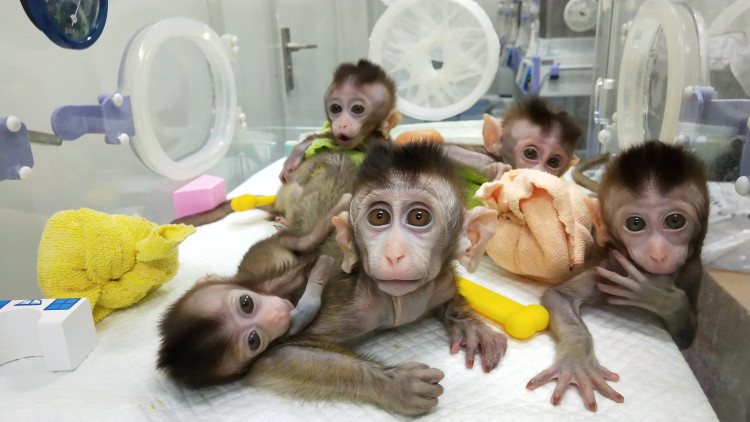China has successfully cloned five monkeys from a gene-edited macaque to enhance biomedical research on various disorders.
While other countries have cloned animals before, this is the first time a multiple set of monkeys was born from a gene-edited donor's fibroblasts.
According to Xinhua News, scientists announced the breakthrough on Thursday, following up with article releases in top Chinese journal, National Science Review. The study's researchers said the monkeys were born at the Institute of Neuroscience of Chinese Academy of Sciences in Shanghai.
In photos released by the agency, the baby monkeys appear to be taken care of by researchers. They have been placed in an incubator and are being bottle-fed by the team. The monkeys can also be seen playing around in their incubator. A photo of the donor monkey has also been released to the public
Flies and mice have been used previously by scientists in studying disorders of the circadian rhythm. However, these animal models have a very different activity routine compared to monkeys, hence the decision to use monkeys for more accurate research results.
The donor monkey is said to have severe circadian rhythm disorders and scientists removed BMAL1 from the monkey's system using gene editing while the monkey was still an embryo. BMAL1 is a key regulatory transcription factor in the circadian region. Afterwards, fibroblasts from the donor monkey were extracted for the cloning process.
Scientists used the same somatic cell nuclear transfer method that was utilized when Zhong Zhong and Hua Hua were cloned in late 2017. The difference is, Hua Hua and Zhong Zhong were cloned from an aborted fetus while the new monkey clones were born from the fibroblasts of a gene-edited male monkey.
Despite the excitement in the biomedical field, China's cloned monkeys sparked concerns among animal welfare groups across the world.
Amid opposition, China has insisted that the cloned monkeys will help create a breakthrough in the study of various human diseases including depression, sleep disorders, Alzheimer's disease, and even cancer.
So far, the cloned monkeys have started showing "negative behavior" and high anxiety levels. Some of them have also displayed "schizophrenia-like behaviors," Reuters reported.
Chinese scientists have ensured in their report that the program is not violating any rules under international ethical standards for animal research. Furthermore, the study is being supervised by the institute's ethics panel.
A press conference was held in Shanghai on Wednesday, January 23. Zhou Dejin, director general of Bureau of Science Communication of Chinese Academy of Sciences was among the speakers.





